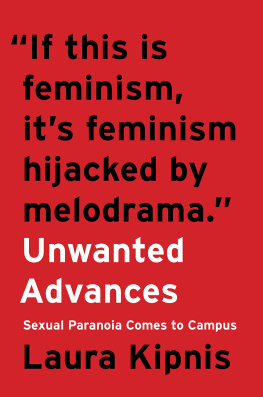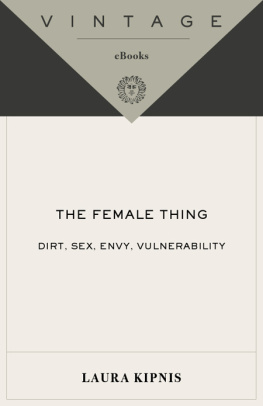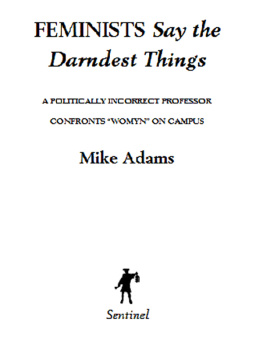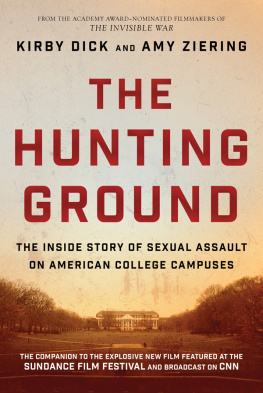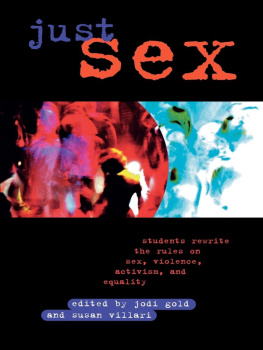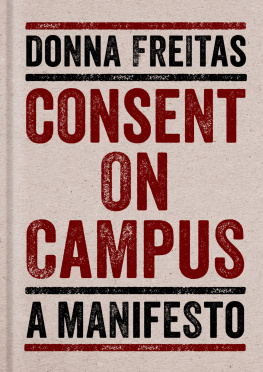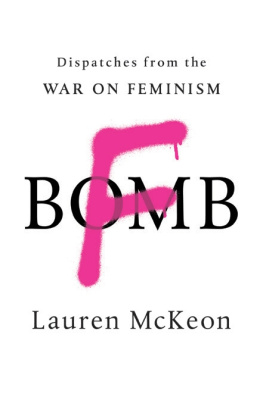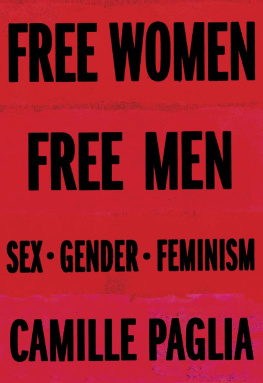Contents
For Myra, Nancypants, and little Lans
The people Ive named in the book are those whove given me permission to use their names. Ive also named public figures and those involved in these events in an official capacity (some of whose names have already been made public in lawsuits anyway). Ive changed the names of students, and others who prefer not to be named. Ive also changed the names of a few people Id otherwise fear running into on my campus.
Lately Ive been thinking that future generations will look back on the recent upheavals in sexual culture on American campuses and see officially sanctioned hysteria. Theyll wonder how supposedly rational people could have succumbed so easily to collective paranoia, just as we look back on previous such outbreaks (Salem, McCarthyism, the Satanic ritual abuse preschool trials of the 1980s) with condescension and bemusement. Theyll wonder how the federal government got into the moral panic business, tossing constitutional rights out the window in an ill-conceived effort to protect women students from a rapidly growing catalogue of sexual bogeymen. Theyll wonder why anyone would have described any of this as feminism when its so blatantly paternalistic, or as political correctness when sexual paranoia doesnt have any predictable political valence. (Neither does sexual hypocrisy.) Restoring the most fettered versions of traditional femininity through the back door is backlash, not progress.
I didnt exactly mean to stumble into the middle of all this, and I hope that doesnt sound disingenuous. Sure, I like stirring up troubleas a writer, that isbut believe me, Im nobodys idea of an activist, quite the reverse. Despite being a left-wing feminist, something in me hates a slogan, even well-intentioned ones like rape culture. Worse, I tend to be ironicI like irony; it helps you think because it gives you critical distance on a thing. Irony doesnt sit very well in the current climate, especially when it comes to irony about the current climate. Critical distance itself is out of fashionnot exactly a plus when it comes to intellectual life (or education itself). Feelings are whats in fashion. Im all for feelings; Im a standard-issue female, after all. But this cult of feeling has an authoritarian underbelly: feelings cant be questioned or probed, even while furnishing the rationale for sweeping new policies, which cant be questioned or probed either. (I speak from experience here.) The result is that higher education has been so radically transformed that the place is almost unrecognizable.
There are plenty of transformations Id applaud: more diversity in enrollments and hiring; need-blind admissions; progress toward gender equity. But personally, I dislike being told what I can and cant say. Beyond that, there are pretty important freedoms at stake that are worth fighting to preserve. Hence this book, which I suspect is going to test the limits of what can and cant be said about the sexual and intellectual situation on campus and beyond at the present moment. If this sounds like activism, well, Ive been driven to itentirely against my own naturewhich shows just how bizarre its gotten in higher education these days.
When I first heard, in March 2015, that students at the university where I teach had staged a protest march over an essay Id written about sexual paranoia in academe, and that they were carrying mattresses and pillows, I was a bit nonplussed. For one thing, mattresses had become a symbol of student-on-student sexual assaulta Columbia University student became known as mattress girl after spending a year dragging a mattress around campus in a performance art piece meant to protest the universitys ruling in a sexual assault complaint shed filed against a fellow studentwhereas Id been talking about the new consensual relations codes prohibiting professor-student dating. I suppose I knew the essay would be controversialthe whole point of writing it was to say things I believed were true (and suspected a lot of other people thought were true), but werent being said for fear of repercussions. Still, Id been writing as a feminist. And I hadnt sexually assaulted anyone. The whole thing seemed incoherent.
According to our student newspaper, the mattress carriers on my campus were marching to the university presidents office with a petition demanding a swift, official condemnation of my article. One student said shed had a very visceral reaction to it; another called it terrifying. Id argued that the new codes infantilized students and ramped up the climate of accusation, while vastly increasing the power of university administrators over all our lives, and here were students demanding to be protected by university higher-ups from the affront of someones ideaswhich seemed to prove my point.
The president announced that hed consider the petition.
In retrospect, maybe it was shortsighted, but I hadnt actually thought about students reading the essay when I wrote itwho knew students read The Chronicle of Higher Education? Id thought I was writing for other professors and administrators. Despite the petition, I assumed that academic freedom would prevailfor one thing, Im tenured (thank god), at a research university. Also, I sensed the students werent going to come off well in the court of public opinion, which proved to be the case. Marching against a published article wasnt a good opticit smacked of book burning, something Americans generally oppose, while conveniently illustrating my observation in the essay that students assertions of vulnerability have been getting awfully aggressive in the past few years. Indeed, I was getting a lot of love on social media from all ends of the political spectrum, though one of the anti-PC brigade did email to tell me that, as a leftist, I should realize that these students were my own evil spawn. Yes, I was spending more time online than I should havethough, in fact, social media was my only source of information about the controversy: no one from the university had thought to let me know I was being marched on. (I wasnt teaching that quarter and was trying not to be around much.) I first learned about the events on campus from a journalist in New York.
Let me be the first to admit that being protested has its gratifying side: when the story started getting national coverage, I soon realized my writer friends were all jealous that Id gotten marched on and they hadnt. I began shamelessly dropping it into conversation whenever possibleOh, students are marching against this thing I wrote, Id grimace, in response to anyones How are you? I briefly fantasized about running for the board of PEN, the international writers organization devoted to protecting free expression.
Things seemed less amusing when I got an email from the universitys Title IX coordinator informing me that two graduate students had filed Title IX complaints against me on the basis of the essay and subsequent public statementsthis turned out to be a tweetand that the university had retained a team of outside investigators to handle the case. There were various ominous warnings about keeping the matter confidential.
Perhaps youre wondering how an essay falls under the purview of Title IX, the federal statute meant to address gender discrimination and funding for womens sports? I was wondering that myself, and continued to wonder during the seventy-two-day investigation that followed. Ill have plenty more to say about the Title IX process, but the answer, in brief, is that the culture of sexual paranoia Id been writing about isnt confined to the sexual sphere. Its fundamentally altering the intellectual climate in higher education as a whole, to the point where ideas are construed as threatswriting an essay became creating a chilling environment, according to my accusersand freedoms most of us used to take for granted are being whittled away or disappearing altogether. Sexual paranoia has converted the Title IX bureaucracy into an insatiable behemoth, bloated by its own federal power grab, though protests are few becausewhat are you, in favor of rape culture or something? Also, paranoia is a formula for intellectual rigidity, and its inroads on campus are so effectively dumbing down the place that the traditional ideal of the universityas a refuge for complexity, a setting for the free exchange of ideasis getting buried under an avalanche of platitudes and fear.

